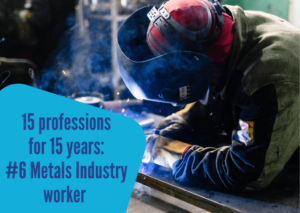The first link in the chain of the modern world
This year, Link2Europe celebrates its 15th anniversary, and to add to the excitement, we are taking a look at the most requested profiles we’ve been recruiting throughout the years.
The Belgian economy definitely drives in the fast lane and therefore it knows a great turnover of talented workers. For over 15 years, Link2Europe has been the trusted partner to look for and find strong candidates to keep up the pace. To mark our anniversary, we present the top 15 highest demanded profiles in Belgium. Today, let’s take a look at the metalworker, a very versatile but demanding line of work.
The metal industry, where it all begins
Automotive, construction, mechanical sector, etc. They all have a common starting point; the metal industry. Without finely crafted steel parts, assemblers would have nothing…to assemble.
The iron and steel industry has long been a major industrial sector of the Belgian economy. Some of the largest steel factories in the world are situated Belgium. The steel factories of Arcelor Mittal near Ghent and Seraing remain, to this day, world leaders in steel production. Although the European steel industry is slowly losing terrain to the Eastern parts of the world, the Western iron and steel industry keeps its seat at the table due to its specialization in high technology and value added steels, with precise specifications from quality-demanding customers.
Silhouette: metalworker
Without metalworkers, the world as we know it wouldn’t exist. And since there is such a high demand for quality steel parts, working in metal can include many different things. You could make metal constructions for buildings, automotive or civil infrastructure, or you could be a welder, cutter or solder. Another branch in the steel sector is that of machine operator, with the most common job function being a CNC machine operator. And then there are the material handlers who pack the steel and get it ready for send-off. For most of these job positions, you will receive training on-the-job! The PC for any worker in the steel sector is 111.01.
A day in the life of a metalworker
Get ready for physically hard work, mostly in a hazardous environment. There will be lots of noise and dirt, but that doesn’t faze you because you know that this job is one of the most respectable in the world. You get to bend steel to your will and make something that will last eons. To do this job right, it is very important to understand and respect the safety rules. You will have to wear protective clothes like shoes, safety glasses, hearing protection and a uniform. Depending on the company, you may work in 2 or 3 shifts, a day shift or a steady night shift. On average, a metalworker works 38 hours a week.
Your income and the most common benefits
- Salary on average of 12,53 to 16 euros per hour. Years of experience can increase the salary.
- If you work in shifts, you will get a shift bonus
- Holiday money
- End of year bonus
- In most cases, meal vouchers are included. The amount will differ for most companies.
- Overtime paid at 150%
What makes a good metalworker?
- EU nationality
- You are in good physical condition
- You have some years of experience in the field
- You speak communicative English, Dutch or French – the language is necessary to understand the safety rules.
- For some jobs in the metal sector, like welding or the operation of a CNC machine, you need to have the necessary certificates, skills and experience. For example, you need to be able to read and understand technical drawings.
Ready, set….work!
Over the last 15 years, Link2Europe has recruited many workers for the metal industry. Be it in temporary projects, like the ones that start in late spring and last to the end of summer, or permanent positions. Something for you? Check out our jobs in the metal industry here.
We can’t wait to get you on your way!




